Christian Pulisic may have taken aim at the lack of partisan support in a win over Morocco, but his performance drew ample praise as the U.S. gears up for the World Cup.
View the original article to see embedded media.
CINCINNATI — For the layman, it was extraordinary. For Christian Pulisic, it was expected. And once again, the margin of victory for the U.S. men’s national team could be measured, in part, by the distance between Pulisic’s ability and that of the average—or even exceptional—player.
Amid the heat and humidity of FC Cincinnati’s TQL Stadium, and forced to work hard early by a Moroccan side as pressed for World Cup preparation time as the hosts, the U.S. men’s national team took a lead it never relinquished on another gorgeous, game-breaking play by Pulisic. The U.S. captain settled Walker Zimmerman’s long and high, over-the-shoulder pass with one subtle flick of the right foot, shielding the ball from Morocco defender Samy Mmaee. An instant and two touches later, Mmaee was flat on his back. Pulisic had cut back toward the center of the penalty area before alertly finding Brenden Aaronson for an easy, 26th-minute finish.
“I guess for you guys it might not be easy but it’s what I’ve done—I’ve been training this my whole life,” Pulisic said following the 3-0 win when asked about the play. “So for me, it’s a touch that I expect myself to make. Yeah, maybe it’s not for everyone.”
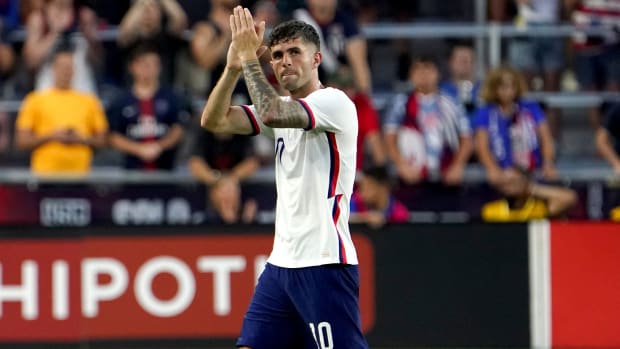
Kareem Elgazzar/The Enquirer/USA TODAY Network
Pulisic was matter-of-fact, but Aaronson and U.S. coach Gregg Berhalter, who’ve been around the game a bit, were as impressed as those watching from the stands and press box.
“It was magical from Christian. He was magical and for him to be selfless like he was, to give me the ball and to score, it was great,” Aaronson said. “Thank you, Christian.”
Berhalter was equally effusive.
“That’s what separates really good players from great players,” the manager said.
“The ability of players to to control the ball at high speed and change direction at high speed with the ball is what really separates players at the next level. And Christian definitely has that,” Berhalter added. “Plays like that … really separate him from the pack.”
Pulisic’s performance, which included more than that scintillating early assist, stood out as one of the feel-good signs from Wednesday’s friendly, the first of six the U.S. will play before the World Cup kicks off in November. Morocco, ranked 24th by FIFA and second in Africa, went unbeaten in qualifying and features multiple players from Europe’s top leagues, including Paris Saint-Germain wingback Achraf Hakimi and well-regarded Sevilla goalkeeper Yassine Bounou. It was a very different sort of opponent for a U.S. squad that’s been accustomed to regional foes.
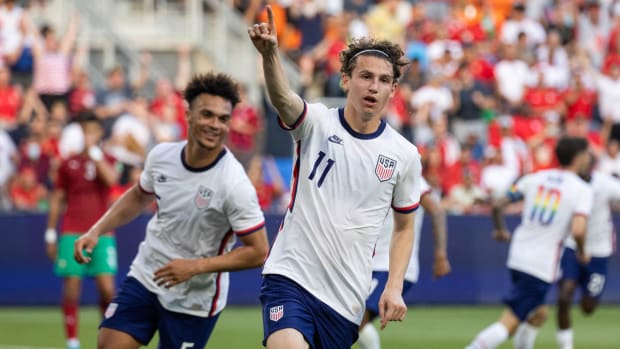
Trevor Ruszkowski/USA TODAY Sports
There’s no way to replicate the intensity of a World Cup game, and Wednesday’s affair was a wide-open, free-flowing affair that would surely leave managers cringing if the stakes were higher. Morocco had its chances. The U.S. finished theirs.
If anything from Wednesday’s exhibition might resemble what the young Americans will experience on the big stage in Qatar, it would be the cohort of fans supporting the other team. Morocco’s first U.S. visit in 16 years attracted several thousand partisans to the year-old, 26,000-seat venue. Pulisic noticed, telling ESPN shortly after the whistle that he wasn’t “super happy” with the unfamiliar and unfriendly proportion. The last time the U.S. played here, a frenzied crowd helped catalyze a stirring 2-0 qualifying defeat of Mexico that cemented the Americans’ regional ascendency and set them on the path to Qatar. The context and consequences were a whole lot different Wednesday night.
But if Pulisic was bothered during the match, it never showed. His recent knack for overcoming or forgetting disappointment and distraction when he puts on a U.S. shirt has been both reliable and remarkable. He endured a long, difficult season at Chelsea, where his contributions to a Club World Cup triumph and runs to two cup finals often were overshadowed by spells on the bench. Pulisic spoke a couple times about that grind and its impact on his mental health. But U.S. camp seems to reinvigorate him, and his devotion to the program is evident on multiple levels. His hour-plus on the field against Morocco was intense, energetic and productive. Playing mostly in the left channel, Pulisic repeatedly found the ball, connected with teammates and created chances.
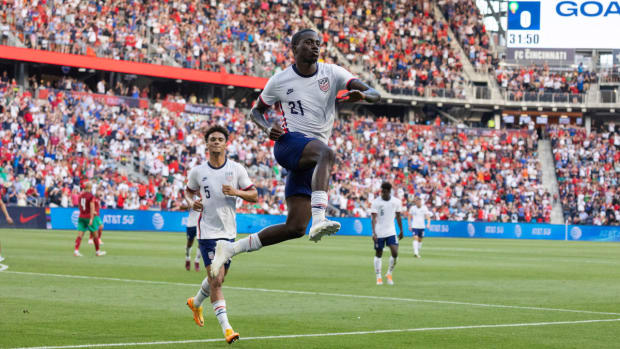
Trevor Ruszkowski/USA TODAY Sports
Tim Weah lifted the U.S. to a two-goal lead with a well-hit, 32nd-minute shot that seemed to shimmy right through Bounou, and then Pulisic had the chance to score himself when he drew a penalty kick foul in the 61st. He stood at the spot while the Moroccans argued the call, holding the ball and preparing to take the kick. Then, as things settled down, Pulisic handed the ball to his U-17 residency roommate Haji Wright, a second-half sub who, at 24, was making a long-awaited U.S. debut. Wright, a striker who earned his call-up with a run of goals in the Turkish Süper Lig, stepped up and slotted the ball home.
“It’s also a good story and really great leadership when you see Christian giving the penalty to Haji. It shows how selfless the leaders are on this team, desperately wanting him to succeed,” Berhalter said.
Helping Pulisic succeed was a big part of the U.S. game plan, and in turn Pulisic elevated his play and those around him.
“We adjusted in our build up to put Christian in a position between the lines that we thought he can really hurt the opponent, and he did a great job of doing that,” Berhalter said. “For us, he was coaches man of the match today, for the way he led with his intensity, but also his play on the field. Great, great assist to Brenden, a number of other chances, got fouled for the penalty.
“But it's more than the actions on the field,” he continued. “I think it’s the intensity in the warm-up that he showed, I mentioned the selflessness of giving Haji the penalty kick in that moment, not needing the spotlight and not needing to score the goal—wanting to put his teammate in a great position. And that's Christian, you know? When you have leaders like that, you're lucky.”
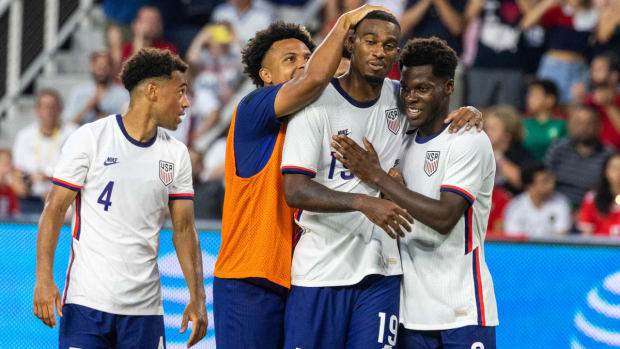
Trevor Ruszkowski/USA TODAY Sports
The Americans’ approach to this friendly was what Berhalter wanted to see. Several players have said they were excited to see a World Cup opponent from outside Concacaf, and they’re all well aware that roster spots are up for grabs and time is short (there are three more games in the next couple weeks, starting with Sunday’s friendly against Uruguay).
It was hot Wednesday night, and the intensity and the crowd may not have been at do-or-die, qualifier levels. But the U.S. gained as much from the game as it could hope for, getting three players their senior debuts and experimenting with a tweak in Berhalter’s 4-3-3 that looked promising (Aaronson played as a central midfielder, Yunus Musah dropped closer to holder Tyler Adams and Pulisic and Aaronson occupied the channels while Weah and left back Antonee Robinson provided width).
Goalkeeper Matt Turner was excellent, making several saves, and he clinched the shutout when Morocco missed a late and very generous penalty.
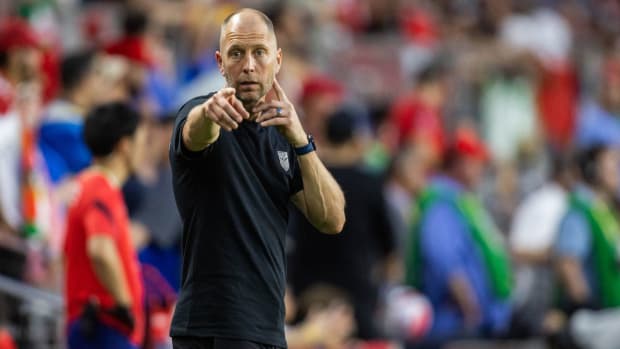
Trevor Ruszkowski/USA TODAY Sports
“We talked about … establishing a baseline for this group about how we can perform against a World Cup opponent and I felt like the group went out and showed exactly how good we can be, but also at times vulnerable,” Berhalter said. “And for us, I think we're very happy with the result. We still know that we need to keep improving. And that's why this game was so good for us.”
Considering the timing and the questions surrounding his club career, it was good for Pulisic as well. His consistency and quality are game-changers.
“That’s how we treated it tonight—we wanted to see it like a World Cup game and we want to go out and we want to compete and win,” Pulisic said. “It’s an opponent that’s going to be there in the World Cup, and all-in-all I’m happy with the improvement. Obviously it’s nice to have the weight of qualifying off our back, and we’re ready to go to this World Cup and now it’s just about preparing for that.”
More Soccer Coverage: